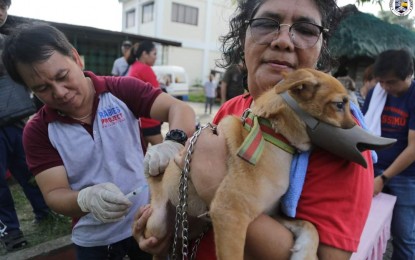
ANTI-RABIES VAX. A pet owner in Pangasinan has her pet vaccinated by personnel of the Provincial Veterinary Office in this undated photo. The provincial government is strengthening its anti-rabies campaign due to increase in cases from January to June this year. (Photo courtesy of the province of Pangasinan)
MALASIQUI, Pangasinan – The Pangasinan’s Provincial Health Office (PHO) and Provincial Veterinary Office (PVO) are strengthening their anti-rabies vaccination drive amid the 125 percent annual increase in cases to date.
Data gathered by the Philippine News Agency on Monday showed that the province’s 12 Animal Bite Treatment Centers recorded about 47,533 animal bite incidents in the first quarter of 2024, majority of which were by dogs.
Based on the data from the Provincial Health Office’s (PHO) Epidemiology and Surveillance Unit, nine fatalities were recorded from Jan. 1 to July 8 this year, up from four cases in the same period last year.
Of the nine victims, eight did not receive anti-rabies vaccines after they were bitten while one was vaccinated but without the equine rabies immunoglobulin dose.
The towns of Mangatarem and Sison both registered two fatalities while one each was recorded in Aguilar, Bolinao, Bayambang, Binalonan and Tayug.
Provincial veterinarian Arcely Robeniol, in an interview, said part of their program includes the mass vaccination of dogs and cats against rabies, deworming, vitamins supplementation, castration, and spaying.
She said they have already immunized 146,019 dogs from January to June this year, exceeding the 107,055 dog population in the province.
“We have the mass vaccination and dog population control programs to prevent rabies among the animals and eventually prevent rabies among humans as well,” she added in Filipino.
Robeniol encouraged dog owners to have their pets given anti-rabies vaccines once they turn three-month-old, although the pets can be vaccinated as early as one-month provided that the puppy is healthy. The succeeding doses will be given on a yearly basis.
She also advised people to not provoke dogs, stay away from stray dogs, report animal bite incidents to the local government or village officials, and to immediately seek medical intervention once bitten.
Robeniol said dogs involved in biting incidents should be placed in a 14-day observation period on a leash and should be not slaughtered.
PHO chief Dr. Anna Teresa de Guzman, in a radio interview, said rabies is preventable but it can also be fatal, thus the vaccines being provided by the Department of Health (DOH) through the local governments.
“The vaccines we are receiving are coursed through the PHO. In 2023, we received 10,376 vaccines and in first semi-annual of this year, we received 6,470 vaccines,” she said.
Dr. Racquel Ogoy of the Provincial Hospital Management Services Office said the provincial government has also allotted PHP16 million for the purchase of 11,670 vials of anti-rabies vaccines and immunoglobulin. (PNA)
